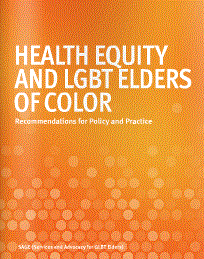 NEW YORK, — Services and Advocacy for GLBT Elders (SAGE) today released Health Equity and LGBT Elders of Color, a new report that examines health disparities faced by lesbian, gay, bisexual and transgender (LGBT) older people of color, and offers policy solutions in 10 areas to address these challenges. The report’s release coincides with National Minority Health Month, an initiative of the federal Office of Minority Health to raise awareness about health disparities that continue to affect racial and ethnic minorities—among them a rapidly growing population of LGBT elders of color who are often underserved and largely rendered invisibly in public policy discussions.
NEW YORK, — Services and Advocacy for GLBT Elders (SAGE) today released Health Equity and LGBT Elders of Color, a new report that examines health disparities faced by lesbian, gay, bisexual and transgender (LGBT) older people of color, and offers policy solutions in 10 areas to address these challenges. The report’s release coincides with National Minority Health Month, an initiative of the federal Office of Minority Health to raise awareness about health disparities that continue to affect racial and ethnic minorities—among them a rapidly growing population of LGBT elders of color who are often underserved and largely rendered invisibly in public policy discussions.
“SAGE is proud to release the new policy report Health Equity and LGBT Elders of Color during National Minority Health Month,” said Michael Adams, SAGE executive director. “As a national organization working with constituents who are both LGBT identified and older adults, we understand that individuals and communities have unique needs because of the intersections of identities. LGBT elders of color are historically marginalized on multiple fronts and their needs are often under addressed in the mainstream aging field and in the popular LGBT rights movement. This groundbreaking report sheds light on the health disparities of LGBT elders of color and how to address them.”
The need to implement policy solutions to the health challenges facing LGBT elders of color is growing more urgent as the U.S. becomes increasingly older and more diverse. According to the 2010 U.S. Census, there are more than 40 million adults aged 65 and older in the U.S., a population that will more than double over the next four decades. By 2050, Latino, Black, Asian and Pacific Islander, and American Indian and Alaska Native people will comprise more than 40 percent of this elder population, and the number of LGBT elders will more than double in size to roughly 3 million, based on conservative estimates
The report explores 10 policy areas where health and wellness can be improved for LGBT older people of color, including:
- Older Americans Act and LGBT older adults
- Older Americans Act and cultural and linguistic competence
- Federal funding and programs for LGBT elders of color
- Engaging LGBT communities of color in health reform
- Strengthening Social Security for LGBT older people
- Building data and knowledge on LGBT elders of color
- Decreasing elder abuse among LGBT older adults;
- Secure and affordable housing for LGBT communities of color
- Federal support for older adults with HIV
- Access to safe and necessary care for transgender elders
In addition to policy recommendations, the report includes stories and quotes from experts in the field about the unique health disparities specific LGBT communities of color encounter in their everyday lives as they age.
SAGE has long been committed to the health and well-being of LGBT elders of color. Led by SAGE, and established in 2010 through a federal grant from the U.S. Department of Health and Human Services, the National Resource Center on LGBT Aging is the country’s first and only technical assistance resource center aimed at improving the quality of services and supports offered to LGBT elders.
The National Resource Center on LGBT Aging provides resources specific to transgender aging, racial equity and its Web site can be translated into more than 50 languages. Also in 2010, SAGE was a founding member of The Diverse Elders Coalition (DEC), whose purpose is to promote federal policy solutions that enhance the quality of life for our country’s diverse aging communities.
In 2004, SAGE established the neighborhood program SAGE Harlem, strengthening SAGE’s responsiveness to communities of color by ensuring that LGBT elders in Harlem, East Harlem and the Bronx can benefit from culturally and linguistically appropriate services.
The report is currently available free of charge. To download the report online, visit sageusa.org











